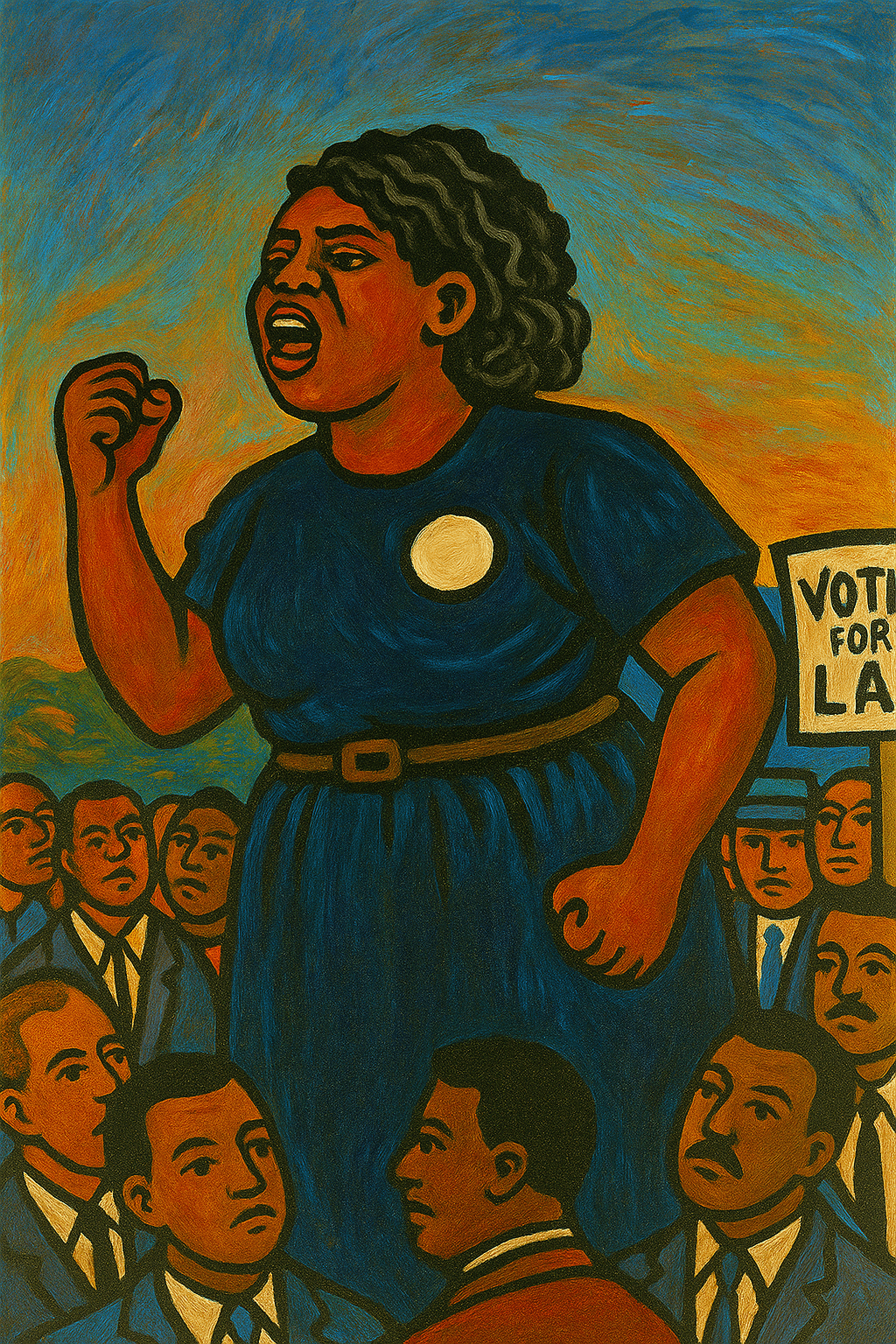IN Focus: Fannie Lou Hamer (Oct. 6, 1917 – Mar. 14, 1977)
Fannie Lou Hamer was a sharecropper-turned-powerhouse whose voice shook the walls of American politics. Born in 1917 in Mississippi, she worked the cotton fields from the age of six and didn’t enter the civil rights movement until her mid-40s. But once she did, her voice—resonant, righteous, and unwavering—became one of its most powerful.
In 1961, she was forcibly sterilized with a hysterectomy without her knowledge or consent. The surgery was performed by a white doctor during a procedure to remove a uterine tumor. This was a common practice targeting poor Black women in the South, so much so that it was known as the "Mississippi Appendectomy".
In 1962, Hamer tried to register to vote and was fired and evicted the same day. Not long after, she was beaten in jail for her activism, suffering permanent kidney damage. Still, she rose. Her most iconic moment came at the 1964 Democratic National Convention, where her televised testimony about voter suppression and violence stunned the nation.
Hamer co-founded the Mississippi Freedom Democratic Party, helped run Freedom Schools, and registered thousands of Black voters. She famously declared: “I’m sick and tired of being sick and tired.” Her words still echo wherever people demand dignity.
Honor the Legacy. Wear the Story. Grab the "Fannie Lou Hamer is INerasable" t-shirt from our Legacy Collection—honor history and celebrate resilience.
INerasable: Fannie Lou Hamer's Legacy
Because she turned pain into power. Fannie Lou Hamer is INerasable because she taught America that the vote isn’t just a right—it’s a fight.
She was not a celebrity, not a politician, not Ivy-educated. She was a poor Black woman from the Delta who stood toe-to-toe with presidents and party leaders—and refused to be silenced.
Hamer’s story reminds us that democracy is not handed down—it’s pulled up from the soil, demanded in the streets, and defended by those most forgotten.
INteresting Fact
Despite being beaten nearly to death in jail for registering Black voters, Fannie Lou Hamer testified at the 1964 Democratic Convention on live TV — shaking the nation’s conscience.
INteresting Fact
Despite being beaten nearly to death in jail for registering Black voters, Fannie Lou Hamer testified at the 1964 Democratic Convention on live TV — shaking the nation’s conscience.
Art IN Context: Folk Art and the Power of the People
Fannie Lou Hamer is rendered in Folk Art—a tradition born not in galleries, but in kitchens, porches, and protest. Folk Art celebrates community, storytelling, and everyday heroes, making it the perfect frame for Hamer’s grassroots power.
The portrait is textured like a patchwork quilt—each color block a memory, a bruise, a hymn. Her mouth is open mid-speech, her hand raised not in greeting but in testimony. It’s not polished, it’s potent. Just like her.
Folk Art reclaims what institutions overlook. It doesn’t require approval—it demands attention. This rendering honors Hamer not as a saint, but as a soul whose courage was built on truth, faith, and grit.
IN Depth: Resources to Learn More
Books & Articles
- This Little Light of Mine: The Life of Fannie Lou Hamer – Kay Mills
A vivid, well-researched biography chronicling Hamer’s journey from sharecropping in Mississippi to becoming a voice of uncompromising truth in the civil rights movement.
➔ https://library.si.edu/donate/adopt-a-book/little-light-mine - The Speeches of Fannie Lou Hamer: To Tell It Like It Is – Maegan Parker Brooks & Davis W. Houck (Eds.)
A collection of Hamer’s speeches that highlight her power as an orator and her role in shaping the moral clarity of the civil rights era.
➔ https://www.upress.state.ms.us/Books/T/The-Speeches-of-Fannie-Lou-Hamer - Voice of Freedom: Fannie Lou Hamer – Carol Boston Weatherford & Ekua Holmes (Children’s Book)
A beautifully illustrated, age-appropriate introduction to Hamer’s life and activism.
➔ https://socialjusticebooks.org/voice-of-freedom-fannie-lou-hamer/
Archives
- SNCC Digital Gateway – Fannie Lou Hamer
A detailed historical profile with first-person documents, photos, and SNCC organizing context.
➔ https://snccdigital.org/people/fannie-lou-hamer/ - Fannie Lou Hamer Civil Rights Museum
Exhibitions featuring archival materials from Hamer’s activism in Mississippi.
➔http://www.thefannielouhamercivilrightsmuseum.com/ - National Women’s History Museum – Fannie Lou Hamer
A strong overview of her contributions and why her legacy continues to matter.
➔ https://www.womenshistory.org/education-resources/biographies/fannie-lou-hamer
Multimedia
- Fannie Lou Hamer's America (2022, Documentary)
A critically acclaimed documentary that tells Hamer’s story through her own words—rare archival footage, interviews, and original music.
➔ https://youtu.be/5h2MzXavgEg?si=CkMi3zuF3z4Jot0Q - Fannie Lou Hamer (Eyes on the Prize, 1987) – Season 1, Episode 6: “Bridge to Freedom”
Covers Hamer’s powerful speech at the 1964 Democratic National Convention and the broader fight for voting rights.
➔ https://www.pbs.org/wgbh/americanexperience/films/eyesontheprize/ - Fannie Lou Hamer – “I’m Sick and Tired of Being Sick and Tired” Speech (YouTube Recording)
A raw and powerful recording of one of her most iconic addresses.
➔ https://www.youtube.com/watch?v=ML3WaEsCB98
Exploring Art Styles (Folk Art)
- Folk Art Movement Overview – The Art Story
Offers insight into how folk art uplifts marginalized voices and everyday life—perfect for capturing Hamer’s grassroots activism.
➔ https://www.theartstory.org/movement/american-folk-art/ - Smithsonian American Art Museum – Folk & Self-Taught Art
A stunning collection and analysis of American folk art and its cultural impact.
➔ https://americanart.si.edu/art/highlights/folk
She is IN community. IN witness. INerasable.


